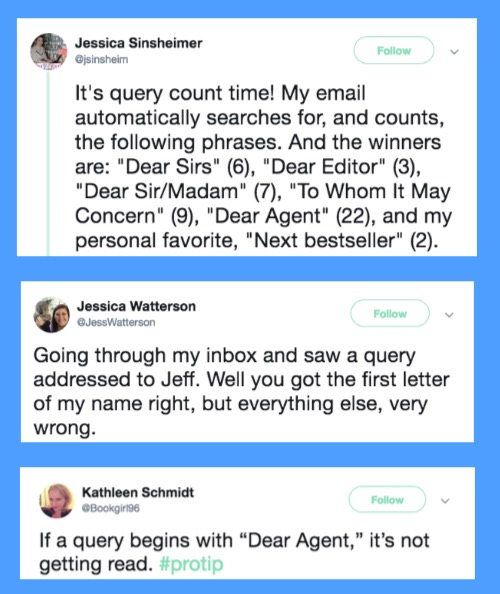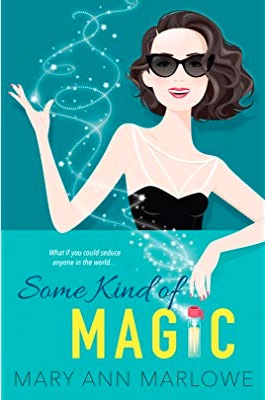This webinar is going to cover not only how to personalize your query letters, but why you have to do it. There is a lot of information out there on query letters: how to write them, what should be included, how to winnow down your 90,000-word book into 300 words or 400 words. But you also need to add that personalization edit.
Why should you personalize your query letter?
Why not just send out one query letter to everybody and be done with it? Just write one that you work really hard on and just copy-paste that out to every agent you can think of? If you do think about it, it is a little bit like marketing. If you were to write one thing to everybody, you're not really writing to any one person. That's something I like to always focus on with authors whose manuscripts that I edit, or whose queries I advise on.
If you guys have explored Reedsy at all, if you've looked for editors, or you've looked for marketers or anything like that, you've probably seen that question on the Reedsy form that you fill out: Who's the audience for your book? A lot of times, I get authors who leave that space blank. That's what it's most of the time because it is really intimidating, but it is something you have to think about. But other times I'll see answers like, "My audience is readers" or "My audience is women," or it's teens, men over 35, whatever.
Those absolutely are categories of people, but they are so broad that you really have trouble marketing to that group of people. Because they're so disparate within women, or obviously within readers.
I imagine you're probably readers or consider yourself readers. Even though we all say that, I bet none of us have identical tastes in reading. That's really something to think about because agents are pretty much that way as well. Just as there are so many different kinds of writers, there are so many different kinds of readers and so many different kinds of agents. And they're interested in different books and kinds of media — so that's why you have to reach out to them in a personal way.
In my time as an agent, I would see authors who would clearly spend so much time on their manuscripts. They'd worked hard. They'd gone over several edits, several drafts as you do when you're writing. And then when it comes to querying, it looks like they just threw something together that either didn't pitch their book well, but even if they put that together, they put the bare minimum of effort in actually selecting who they were querying. I'd get pitch letters all of the time for types of books I was never interested in. Agents have their interests listed all over the internet. It's not hard to find those out there, but apparently, it is hard to choose them correctly.
So if you're here, you probably already know that the query letter does matter. But you need more than just that well-written pitch to get an agent's attention. You do need to show this agent that you are being intentional in your querying, and that you're reaching out to this agent for this book, for this specific reason. You're letting that agent know you're particular about who you query. So why do you have to do that?
The simple reasoning is just that plain marketing again. I think about promotion emails that you get in your inbox. Sometimes they'll say your name at the top, and even though you know it's a spam email from someplace that you bought one thing, one time, you still pause just a half a second longer when it says your name at the top. Getting that pause from that agent is going to be the first step.
Show an agent that you care. That you put care into this letter, into researching agents, into landing upon them for this specific reason. Show that not only are you committed but that you'll probably put care into your work with them too. An agent is vetting you for your work, but they're also vetting you for being a business partner. How are you guys going to work together? They're thinking: Does this person actually put care into all of the steps of this process? Or are they just writing the book and sending it to me and expecting that I do all of the work?
Personalizing your letter and looking for specific agents also shows that you understand your book. You know what your book is about. You know who reads your book. You're not spamming every single agent out there just because they're a literary agent.
Get their name right!
There are tons of ways to personalize. We're going to start with the simplest, most seemingly obvious thing: their name. Remember those marketing emails that you get from Amazon or from Uber that say "Hey Rachel" at the start — the ones that make you pause? Well, if they started that way, but they spell or get your name wrong, it's annoying. It turns you off a little bit from whatever the rest of the email says. And I'm going out on a limb here to assume that you don't want an agent a little bit turned off before they read your pitch. Because the name is important. Beyond just getting it right, it's important to know that you should absolutely always use a name.
A lot of agencies now, they'll use something called a query manager, in which you query not by sending an email or letter, but by putting details in an online form. Or, they will ask you to send all queries to an email address that's submissions@agency.com, or queries@agency.com. In all cases, you should always use a specific name. And know why you're choosing that specific name over any other agent at that website.
You're never going to want to address a query with "To whom it may concern," or "Dear agent," or "Dear sirs," or anything like that. That's going to make the agents on the other end have to try to figure out who you meant to send that to. And you don't want them to pick for you. Anytime that I got one of those generic queries as an agent, it always left me super unenthusiastic before I even began reading.
 Again, having the name correctly, and putting the name there, sounds really basic. You would be shocked by the number of times I received a generic agent query. Or even worse, been copied on an email that was a pasted query letter, and me and 50 other agents in the copy line.
Again, having the name correctly, and putting the name there, sounds really basic. You would be shocked by the number of times I received a generic agent query. Or even worse, been copied on an email that was a pasted query letter, and me and 50 other agents in the copy line.
At the agency, when one of those queries showed up, if it sounded really generic, or if it didn't address it by name, we'd forward around to one another and ask if anyone else received this. "Did you guys get this query letter?" Anytime three of said, "Oh yeah. I got that this morning," someone would just reject it.
At that point, we're thinking, "Well, they're not really doing their research. They're not reading our submissions guidelines that are saying submit to only one of us. They think all three of us would be good fits." So, it really just gets out of the inbox.
Should one use the agent's full name instead of Mr., Ms. or Mrs.? Especially if you don't know the latter's preferred one?
Usually, full name is fine. To me, you can say "Dear Rachel." Even just that is okay. "Dear Rachel Stout." "Dear Ms. Stout." Anything, any of those three is absolutely fine.
Read their bio
When you are querying, especially for the first time, I know it's really easy to get extremely excited by any interest that any agent shows you. And you absolutely should be. Any good feedback on your work is an accolade and is something to feel good about. But you have to remember, it isn't just a flash in the pan connection that you're making for this agent, right here, right now, for this book. You do ideally want this to be a partnership that goes on for several years or for several books.
When this agent tells you their ideas for your book, you want to make sure that those ideas align with your ideas. You want to make sure you guys have the same vision. That's also going to come when you're researching agents. You're going to see: "Okay, this person likes my book right now, but they also like that which is also something I like. And I like this and they like that." And there are other compatible interests there.
At this moment, it does feel like the agent has all of the power, but you guys are benefiting equally. Do keep that in mind. You're not just any author, and they're not just any agent. You guys just really want to make sure you're finding that connection. So, we're looking for ways to find that connection and show that work in your query letter. And doing it well is actually really simple for the size of the effect that it can have.
By the time you're querying an agent, you're probably already on the agency's website. Don't just skip over to that submissions tab. It's super tempting, but don't do it. Most websites are going to have an "About Us" section, or an "About Our Agents" section, or something very similar where you can read a little bit about your preferred agent. And the most basic thing you're going to find is the bio on the company's website.
They're likely going to mention their titles or have a "Recent Books" section. You can see if any titles on that website match any comp titles that you've chosen for your book. Or any titles that seem relevant to your book. Or that you just personally really enjoyed, and you want to reach out to the agent who represented that book, and say, "I love this book that you represented. I'd love for you to be my agent, too."
So, you're going to take that preliminary list you got that name from. Maybe you got it from a big database, or from looking up all the agents who represent thrillers. Then you end up with, for example, 200 agents' names, and you go to their websites and read their bios. You might find a small, seemingly innocuous piece of information, like where they went to college, or what kind of pizza they like (depending on who they are and what they put in their bio). There's going to be something there that'll stick out to you, if the match is good. Just getting their name isn't going to be enough.
I was going to give you an example from my experience. I got a query one time from this author, I don't actually remember exactly what his book was about. But I do remember that it was not a book that I normally would've represented, that I normally would've been that interested in. At first, I was thinking, I'm probably going to reject this, but I'll read the query since I have 10 minutes. I thought this author wasn't doing what I'm saying you should be doing, which is researching for the right agent and querying them selectively. But it turns out he actually was doing just that. He had clearly read my bio on the agency's website. Maybe he'd read a couple blog posts. I don't know. But all he needed was that one line that is highlighted there.

He saw that I grew up in South Jersey. I only learned since leaving New Jersey that no one outside of New Jersey specifies North or South Jersey, but it's very important to us. I grew up there and I've been living in Brooklyn for 10 years. The author learned this from one little line in my bio. The one thing he emphasized in his letter was that his protagonist was also from South Jersey, which I really appreciated him calling out, and that he was currently living in Brooklyn. I got really excited when I saw that. He made a point to say, "I know this is your background. This is also my protagonist's background." And I requested that book right away.
Even though the book wasn't necessarily up my alley subject-wise, I thought, This author is taking time to show me why he was querying me, and I actually might feel more of a kinship with this protagonist given our background. Same thing as when you see your hometown or somewhere you're familiar with in the background of a movie or in a book that you're reading, it's always way more fun when you can visualize the setting, and see what people are going through. I was really excited to request it just based on that.
Other sources of information (or light, totally acceptable stalking)
That piece information was very Googleable about me. But agents are generally pretty public people, so it doesn't take a lot to learn just a little bit about them. Being active in the literary world does mean putting a lot of information out there in writing, in a lot of places.
Beyond the bios on those websites, these are just a few websites that I really like, and I really like to recommend them to authors to find out those little pieces of information that you're going to make the connections with the agents on.
Manuscript Wish List
This is something I really enjoy, particularly because this is something that the agents write themselves. It's not on a company website so they're not tied to the agency's house style of writing bios. On this website, agents can put whatever they want. Some of them, their real personalities will shine through, they'll get funny, they'll get silly, they might list the top ten movies that they saw recently or liked. Maybe one of your books is similar to that. They might just list the genres they are interested in, but usually they list really specific interestd as well. But if you do happen to have a very specific book that an agent has specifically asked for, well then, you're golden.
QueryTracker
It's much more of a database website, but QueryTracker does give you the very basic information about almost all of the agents that you can think of. What I also really like is that QueryTracker has a little forum where authors who are currently querying can give a little bit information about those agents. You might query an agent of whom everybody else says, "Oh, this agent gets back to authors right away. I queried them on Monday, I heard back by Friday." If you queried this agent three weeks ago and you haven't heard back, well then, you know that you can strike in with that agent — because maybe your query got lost or maybe they're considering it for a different reason. Any type of information like that is really helpful.
Publishers Marketplace
This is both an industry website and it's a website that authors can use as well. The portion that's accessible for authors or for people not paying for a subscription is a little bit like an agency website sometimes. Not all agents use it for that purpose, but a lot of agents do. If you search agents on there you'll be able to see genres that they represent as well as self-written bios. Maybe even some books they want to call out as the most representative book deals. If you see that this agent specifically says, "These five books are most representative of my interests. They are books that I have sold." Then, you can look at those books and think, Is my book within that family?
There is a paid portion as well which I don't normally recommend to authors, but if you want to do a really, really heavy research section for just one month, you can pay the $25 for one month and see anything that will be helpful for you. You can see all the book deals that are being reported or reported on Publishers Marketplace which can be helpful.
If you want to find who the agent was for a certain book then you can usually look in the acknowledgements section of that book and the author will usually thank their agent there. If there is a book on a comp titles list or, again, books you think share the same audience as yours, I would absolutely look in the acknowledgement sections.
But you can see all the book deals on this particular website. You can see what books these agents are actually having success selling, as well as what they say they're interested in.
Writer's Digest
This is a great website. They have all different kinds of columns. I would absolutely sign up for their newsletter which will give you new agent alerts, which will give you agents it's currently representing. They will get those in your email, and it's totally free. I just think every author should sign up for it, even if you don't read it every day.
Getting involved in the publishing community can be difficult — but observing it is very easy. On Twitter, even if you're not an active user, you can just make an account, not put anything on it, and follow as many agents, editors, publishing houses, publishing agents, and book people as you like. You are going to get a sense of what's going on in the publishing world, as well as who these people are on a day-to-day basis.
Maybe your dream agent tweets something about their recent trip they took to Marrakech — which just happens to be where your book is set. Well, now you know this agent is recently interested in that setting, so you can just send them the book saying, "I know you really like this place and that's where my book is set."
Perhaps the agent tweets out they really just want to read some women's fiction about a mom and a daughter taking a road trip together, and that's what your book is. You can write to them and you can just come right out and say, "I saw you put on Twitter that you were interested in that kind of book."
Basically, you don't need to know an agent's entire life story. You really just need to pick up on one little moment of connection that you can use that shows why you wrote to this agent. If you can find out more (and I bet that you can for at least 75% of the agents you'll want to query) then you absolutely should.
I think it's a totally acceptable form of stalking. I think every agent who puts that information out there in a public place, you know, don't cross the line, is expecting you to read it and see if you can make a connection.
Where do you use personalization in your query letter?
Unfortunately, there is no direct answer here. It's usually one of two things.
1. You are going to start by telling the agent why you're querying them.
2. Include it in what I like to call the"nuts and bolts" paragraph at the end. That's where you are going to be putting your word count, your genre, who you are, all of that step usually comes in one paragraph at the end. And you can put in why you're querying that agent.
Both have pros and cons. I personally prefer keeping it to the end but that's only because I like to start the query right with the pitch. I like to bring that agent into the world immediately, get them interested in your story, and then tell them who you are and why you're querying them.
The exception is if you have one really specific extremely applicable piece of information. For example:
- If you have protagonists with the same background as the agent or
- If you read on their manuscript wish list (or their bio) that they're looking for a very specific book and yours really fits right into that.
If that's the case, you just start out with that. Because, in the end, you want to get that agent excited about your book and getting that agent excited about reading what the book is about.
Always follow guidelines
No matter whether you're starting with personalization or putting it closer to the end, always follow submission guidelines. Like I said, there isn't any set one way to do it except for the agents who are particular about it. Some agents will say, "I want your query letter in this format, in this order" or ask for something specific in your query letter. Make sure you do that.
It's its own kind of personalization: following submission guidelines. Though most agencies have similar guidelines, there will be subtle differences. Even if they want samples linked in a certain way or a way to format the subject line in the email. Think about that as an element of personalization: following what this agent wants you to do.
Keep your pitch intact
The only other thing I want to bring up is that you want to keep your pitch intact. Put the personalization at the top or put it at the bottom. Keep the pitch for the book altogether, don't stick the personalization in the middle, don't say, "Here is the part that I thought you might really like," or whatever it is. Keep your pitch intact, and follow the submission guidelines.
Consider all parts of your book
There are also other subtler ways to tailor your query letter to a specific agent. You can come out and say, "You like this, my book is this, that's why I'm sending it to you." But there are other ways to push that letter in the agent's direction.
I always like to remind authors that no book is about any one thing. You can pick any book and three people will describe it differently even though they've all read the book. So, there's never any one keyword or topic that you have to stick to when you're researching and querying agents.
For example, one book could be about all of the following:
- a father/son relationship,
- sailing,
- the Florida Keys, and
- aging.
In the same book, those are all equally predominant elements that you could pitch to somebody. Right there, you've got four topics to research and consider. Those are four things that form a focal point of a query letter that you're writing. It doesn't mean that you have to write four query letters because I know query letter writing is already hard, the baseline pitch for your book can remain the same just as your book remains the same. But you can introduce it through four different lenses — as the same way a book can be read through different lenses.
It's that hook, that opening paragraph, that can change per agent if you're changing the way you're pitching your book.
I do have one more real-life example from a query letter that I once received.

This novel was, at its core, what I liked to call a "Rock Star Romance," which is a romance with a rock star. It was pitched this way to a colleague of mine who showed me the query letter after the submission was brought up in conversation.
My colleague was on the fence. "Do I go with this author? Do I not go with this author?" She ended up passing on the book — but told the author that it wasn't because that book didn't have merit, it just wasn't up her alley.
She said that she could query it to a different agent at the agency. If you haven't guessed by now, that agent was me, but the query that I received from her was different from the one that I'd seen on my colleague's desk. It was not a totally different letter, it was just a letter framed differently. Instead of focusing on the romance with the rock star (which did play a huge role in the book), the author emphasized a different element that hadn't shown up in the other query letter. The author brought up this possibly magic/science experiment gone wrong that possibly instigates the romance in the first place.
If there is one thing that I have written about and made clear in the past that I'm interested in, it is that tiny inclusion of magic or suspension of disbelief in an otherwise totally normal and realistic plot. So, that's the element that's a kicker for me. That author clearly read that about me and said, "All right, I've gotten a semi-positive response from this agent's colleague, I want to query her, what does she like that's different from what the other agent likes?" I ended up signing her up. I got her a two-book deal. It was definitely a success story.
Your book can be portrayed in so many different ways. Just start thinking about that.
Don't make something up and force a different angle. If one scene has a dog in it and you find out that the agent is a dog lover, don't say, "My book is about dogs." But if it is something that is definitely viable for different ways for your book to be read, for different interests to be met, think about those and query those different angles. 'Cause you will find that opens up an entirely different cast of agents you hadn't even thought of before.
Unsolicited queries do work
At this point, you might be thinking that that sounds like a lot of work. Googling every single agent. Spending time on every single agent to see what's their specific thing is. What guarantee do I have that this agent is going to read the slush pile anyway?
The slush pile is — if you don't know — what a lot of agents will call unsolicited manuscripts. You maybe believe that you have to know an agent or be friends of a friend of an agent to get their attention. Or you'll have to have published dozens of stories, have articles in literary magazines and journals for you to have a chance.
If you're writing fiction, don't worry if you have not published in the past. Novelists come from everywhere. I once asked agents if previous publication was important to them, and almost 75% of them said that it was not important that a novelist had published in the past. It's more about this book right here, right now.
I surveyed over 20 different agents from some of the top New York agencies. Some were from agencies who have been in the game for two years, some who have been in the game for 25 years. There was a whole range of agents from all different agencies. I found out that agents want queries, they want to sign up new authors, they want to be the first person to find a new book that they can represent, sell, and be behind.
Here are some results that I just want to illustrate:
- 95% of the agents that I queried said they are open to slush.
I'm sure it's going to happen that some agents close for a period of time to slush, but that's because they get a lot of queries they need to catch up with. We should always keep checking in to see if they're open again.
- 66% of agents are reading the slush several times a week or more.
I also know that authors don't always think that agents read their queries. Almost everybody reads them.
My favorite statistic is the one that I always want to tell people:
- 35% of the agents that I talked to said that more than half of their current list comes directly from the slush pile.
In other words, it was by far the biggest source of leads for a whole third of these agents. That goes for the new guys, it goes for the older ones. I've seen agents in all levels of success, in all levels of having been in the game for decades or for two years, everybody is looking at the slush pile.
Also, don't get intimidated by an agent who has 25 years of experience and they have 17 bestsellers to their name and you've read them all, you admire them all. Don't think: I can't query that person because they are too big or they are too good. Everybody's fair game. If they are open to queries, they are open to you.
You should pay real attention to that letter that you're sending. Make sure it's effective and tailored to every agent as much as it can be. Your query letter is your first impression. Your book may be super amazing. It could be the next big thing, but an agent's got to get past the query letter to know that. The point of the query letter is to get the agent to read the book. Once you've done that then your work speaks for itself.
For more Reedsy Live webinars and transcripts, click here to browse through the archive.





